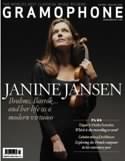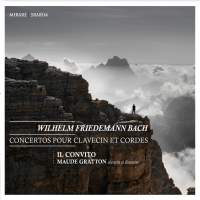Texte paru dans: / Appeared in: |
|
 |
Outil de traduction (Très approximatif) |
|
Reviewer: Jonathan Freeman-Attwood
From the beginning of the melancholic questing of the A minor Harpsichord Concerto to the highly wrought pushmipullyu of the significant E minor work, a riveting concentration of harmonic and textural detail emerges. It’s a style that sails a course straight between his father’s motivic tautness and the dissenting galant of his peers, and it finds its best expression in the framing works, from his early and late periods (c1730 and 1770). What Gratton and Il Convito convey so persuasively in their assuaging and elegant performances is that, beyond Wilhelm Friedemann’s capricious figures, mental robustness and vulnerability cohabit as a kind of conceit. This is perfectly exemplified in the knotty Sinfonia, acting as one of two diverting links between the concertos: JSB’s muscularity at once yields to the fickle asides of CPE Bach but with Wilhelm Friedemann adding a dose of studied instability. Whether it’s really all conceit or partautobiography, the WFB experience is rarely relaxing. The layering of filigree, which doubtless encouraged Carl Zelter,
Mendelssohn’s teacher, to judge his music as ‘petty and fussy’, is handled with exceptional sangfroid by Gratton and her colleagues, letting the music speak openly in her engaging and unforced solo playing, with the dark-hued strings responsive and mainly in tune.
|
|
|
|
|
|
Cliquez l'un ou l'autre
bouton pour découvrir bien d'autres critiques de CD |
|




